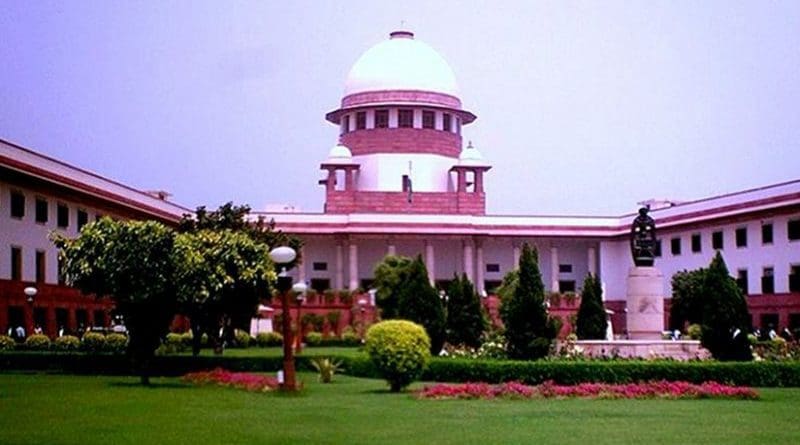India’s Crumbling Judicial System – Analysis
By Observer Research Foundation
By Deepak Sinha*
One can be forgiven for thinking that we live in Africa, once known as the dark continent – where rape and violence and loot are not only endemic, but are also used as a tool by the politicians. We are inured to not only read horrific cases of rape and violence against women and children, but also of the increasing number of cases where rough and ready retribution by locals, merely on suspicion of wrongdoing, seems to have become the norm. In addition, we have gone better and have elected individuals to Parliament, whose actions seem to suggest that they would have been better suited for leadership of organisations like the Cosa Nostra, the Boko Haram or may be even the Islamic State. In all of this, there is no shortage of politicians, from across the spectrum, spouting their usual hypocritical ordure about how justice may take time, but will surely prevail.
But to change the tack, what has really moved this writer was the statement of a former Chief Justice of India, a few months ago that, “I have always fought for it (judicial freedom) and I will be the first person to leave this chair if it is compromised. I promise 1.2 billion people of India that independence of the judiciary will not be compromised.” While this honourable gentleman may have flitted to a post-retirement sinecure, this writer has truly taken his promise to heart, though at the present time, it is not the independence of the judiciary that worries this writer at all, but something much more mundane. It is the manner in which the august members of the judiciary seem to have taken the poet philosopher Khalil Gibran’s stark and wry observation that both the city of the living and of the dead are “for the rich and powerful men”, quite literally. The joke doing the rounds on social media that Dawood Ibrahim is considering surrendering here, because he has absolute trust in the judiciary to do the right thing, seems pretty apt, if not satirical.
Actions, as we all know, speaks much louder than words, and in these last few weeks and months, there has certainly been much action and a perception has clearly gained ground that the spate of judgments somehow seem to have benefited the rich and powerful amidst us. While undoubtedly, the absence of governance and our society’s penchant for always looking to ends and not the means, along with a general absence of moral and ethical integrity must be considered as major reasons for this state of affairs, the collapse of the criminal justice system must also share the blame in equal measure, if not more. It is indeed ironic and most certainly a fitting subject for gallows humour that judges of our higher judiciary are referred to by the honorific ‘justice’.
The judicial system of India has much to be proud of, but unfortunately, providing justice is not one of them, more so, if you happen to be one of the ‘aam janta’ or the ‘Mango People’ as one worthy once referred to that class. The fact that the judiciary is overburdened with massive backlogs caused by a variety of factors ranging from pending vacancies and excessive litigation to police inefficiency, outdated laws and even force majeure have been repeated ad nauseam over the years and no longer cut much ice. As recent elections have shown, the common man is no longer willing to be held hostage by privileged elites who trot out generic excuses at every opportunity while making every effort to preserve the status quo. If the judiciary and its other elements have not heard the clarion call to action, they may soon be in the unfortunate position of finding themselves not just ignored, but even worse, treated as irrelevant.
There have been numerous suggestions to correct the situation mooted by many eminent jurists, legislators and Commissions over the years. However, progress to reform the system has been at a pace that would put any self-respecting tortoise to shame and the judiciary, especially the higher judiciary, cannot shirk responsibility for this dismal state of affairs. The truism that justice delayed is justice denied can only be ignored at great peril as we are in the process of finding out on a daily basis. A little imagination, clarity of focus and a sense of purpose will pay us dividends and is not too much to ask of our eminent jurists.
We need to face the unpalatable truth that no amount of laws or better investigation and policing can ever change the daily carnage that we see around us without the judiciary providing us with what is its primary responsibility, the provision of speedy and equitable justice. The fact that it took 46 deaths in the ongoing Vyapam scam for the Supreme Court to act is a bleak reminder of where exactly our criminal justice system stands today.
*The writer is a consultant with Observer Research Foundation, Delhi and a former senior military officer
Courtesy: The Pioneer, July 31, 2015

